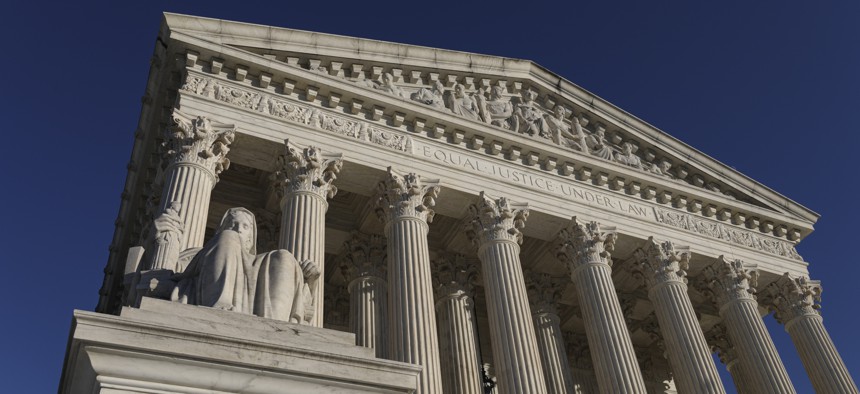
The Supreme Court is weighing whether there is flexibility for lower courts in considering the time limits of federal workers' appeals cases. Anadolu / Getty Images
Supreme Court to hear arguments on federal employee furlough case
The case was significantly delayed as the agency that initially hears federal worker appeals was non-functional for five years.
The Supreme Court will issue a decision on a decade-old case regarding a federal employee whose agency furloughed him for six days in 2013, though the ruling is expected to be limited in scope and concern the timing of the challenge.
The justices accepted the case—known as granting a writ of certiorari—to answer the question of whether a lower court can make an exception to the time limits federal workers typically face to file an appeal. In Harrow v. Department of Defense, the Supreme Court will review the timeliness of an employee’s appeal from the Merit Systems Protection Board to the U.S. Court of Appeals for the Federal Circuit.
Stuart Harrow, a Navy employee, was one of thousands of federal workers at Defense who challenged the department’s decision to furlough civilian employees for six days in 2013 due to sequestration. Harrow unsuccessfully brought his case to an MSPB administrative judge and subsequently appealed that decision to the board’s central panel.
While his case was pending, the board lost its quorum, rendering it incapable of issuing decisions. While his case languished and MSPB remained hamstrung for five years, Defense changed its email system. The board was finally reconstituted in 2022, when it issued a final ruling against Harrow.
The agency sent its decision to Harrow’s old email address, however, and he said he did not become aware of it for several months. He subsequently filed his appeal to the Federal Circuit court 128 days after MSPB issued its final decision, missing the 60-day window required by law. In its defense, the government highlighted that MSPB issued a public notice before issuing decisions that all parties with pending cases should update their contact information.
Harrow told the court the circumstances of his delay made the lateness excusable, but the circuit court said it was not in its jurisdiction to rule on the matter.
“While we may be sympathetic to Mr. Harrow’s situation, this court can only consider whether the petition was timely filed and cannot excuse a failure to timely file based on individual circumstances,” the appellate court said.
Harrow asked the Supreme Court to review the case, arguing the strict timeliness interpretation “blindsides federal employees” who are often representing themselves and understand the deadlines to “be subject to flexibility.” The Federal Circuit “repeatedly has deprived federal employees, usually proceeding pro se, of judicial review of their employment rights by summarily dismissing untimely appeals.” He called that interpretation “unfair” and said it was inconsistent with decisions from the Supreme Court.
The court will hear arguments on the case and issue a decision next year.
More than 32,000 federal employees appealed their sequestration furloughs to MSPB in 2013, leading to a significant backlog the agency was able to work through largely by dismissing the majority of them in bulk.







